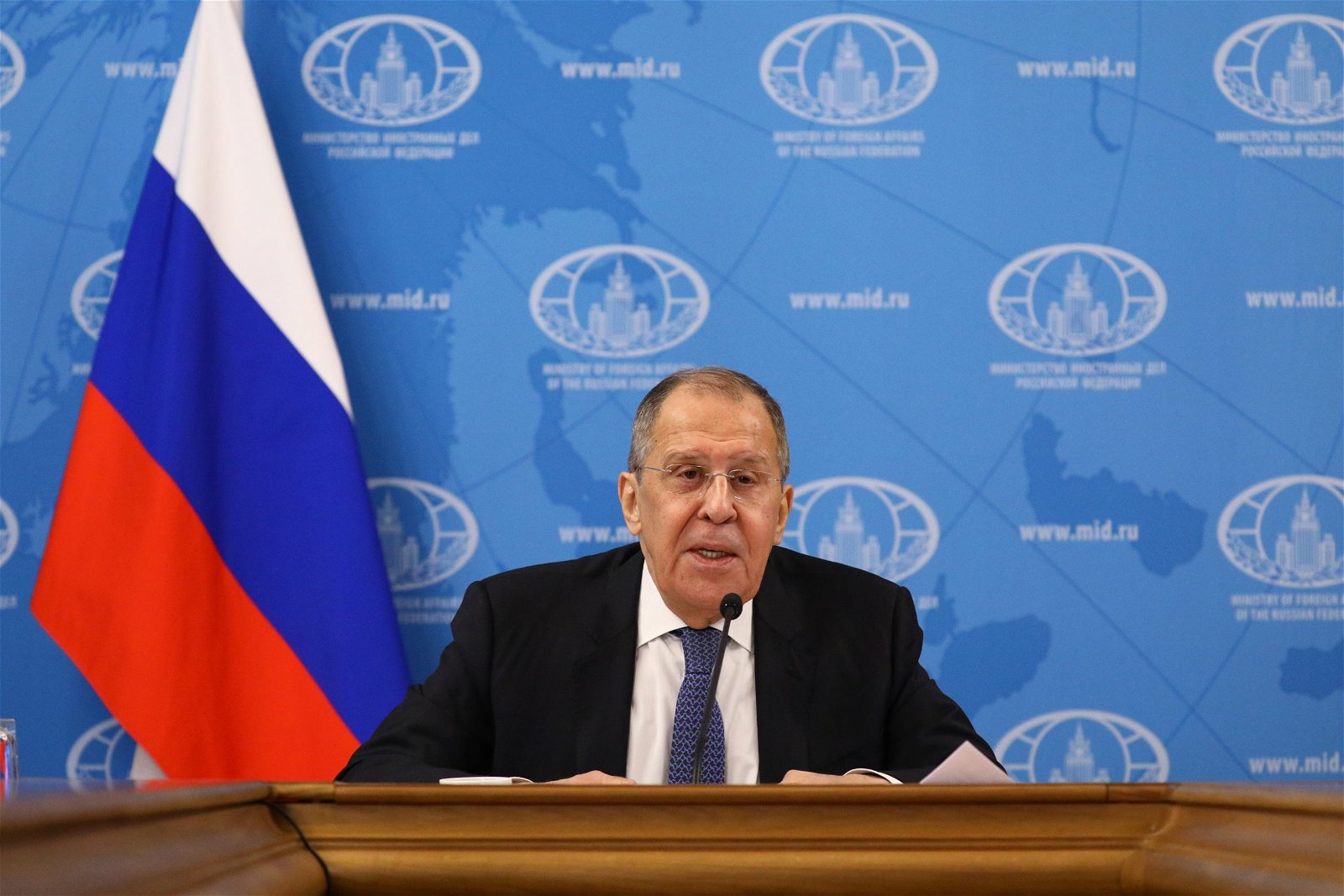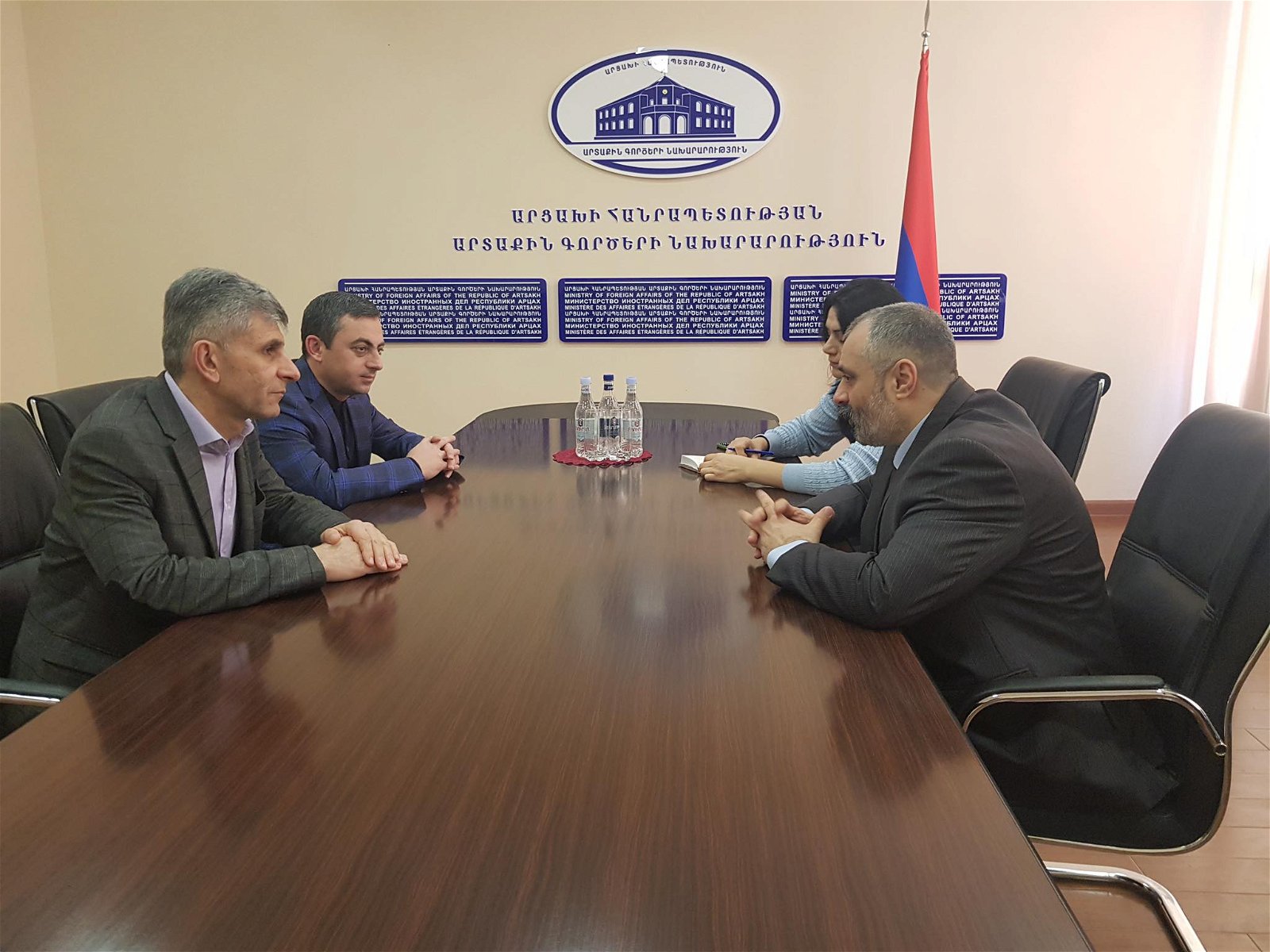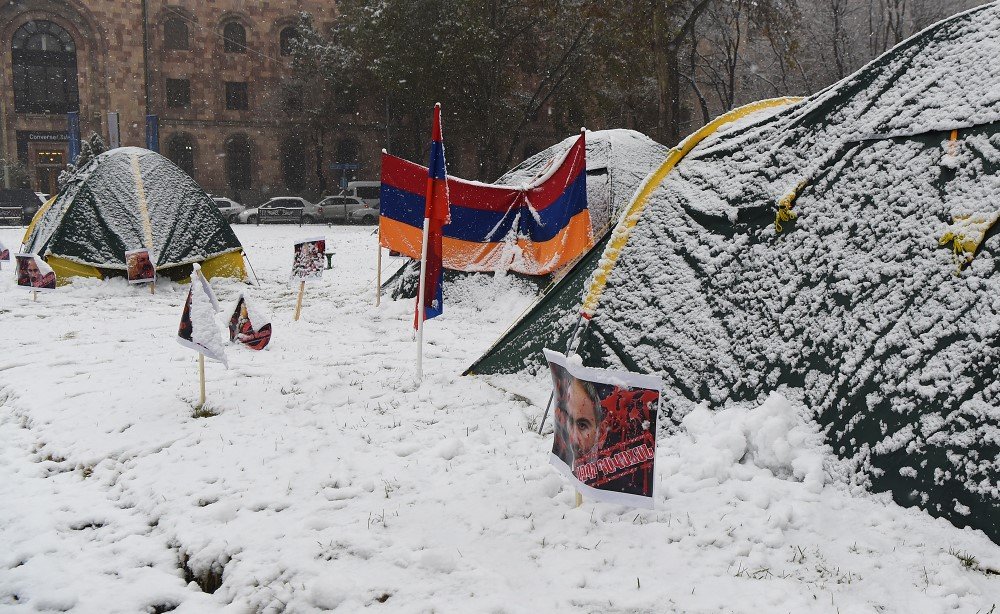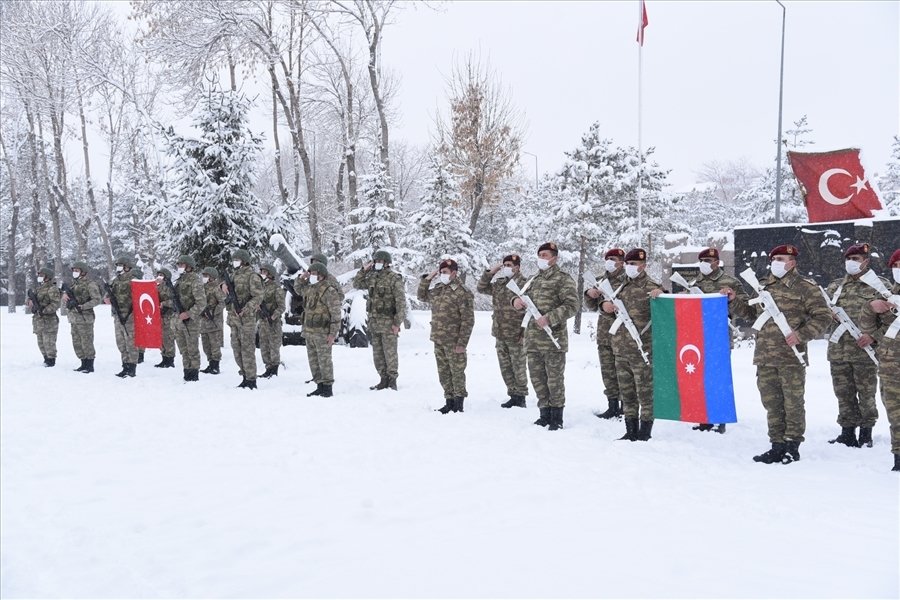
Russian Foreign Minister Sergey Lavrov stated this week that the status of Artsakh is not an immediate priority in the aftermath of the 2020 Artsakh War.
Lavrov addressed several questions about the Artsakh conflict during an annual review press conference on January 18. In response to a question from Azerbaijani media about their protests of visits to Artsakh by Armenian officials, Lavrov said that he saw “no reason why contacts at this level should be prevented,” stating that the Lachin corridor is protected for this purpose. “Armenian officials are involved in providing humanitarian assistance to Nagorno-Karabakh (Artsakh), which does not cause any negative emotions in Baku,” he said. “The fact that some Armenian officials are making rather politicized statements in Karabakh is causing tension. I think it would be better to avoid this.”
The question arose since Azerbaijani political leaders rebuked Armenian Foreign Minister Ara Ayvazyan for his visit to Artsakh earlier this month. The head of the Press Department of the Ministry of Foreign Affairs (MoFA) of Azerbaijan Leyla Abdullayeva called the visit “illegal” and violative of the November 9 trilateral ceasefire agreement. Armenian MoFA spokesperson Anna Naghdalyan denounced these allegations as “completely false and baseless” since “the trilateral statement of November 9 aimed at establishing a ceasefire and deploying Russian peacekeepers in Artsakh does not contain any agreement on Artsakh’s status.”
Lavrov asserted this week that Artsakh’s status should be resolved in the future by the co-chairs of the OSCE Minsk Group. “Status issues will be resolved all the more easily, the sooner the assurances voiced from Baku and Yerevan that the main thing is to improve the daily life of all ethnic and religious communities that coexisted in Karabakh and restore peaceful good-neighborly living on the ground,” he said. He dismissed suggestions that Artsakh should be included in Russia as “exotic.”
In response to a question from Armenian broadcasting company Shant TV about securing the return of Armenian prisoners of war, Lavrov attributed the problem to Armenia’s delay in providing lists of missing persons they want to rescue from captivity to Russia following the signature of the ceasefire agreement. “Azerbaijan gave such lists. They were insignificant…all those mentioned in the Azerbaijani lists were returned,” he said. “On the Armenian side, the lists were not presented immediately or in full.” The Foreign Minister confirmed his knowledge of at least 62 Armenian soldiers and civilians currently detained in Azerbaijan based on talks with his Armenian counterpart.
Armenian human rights activists have accused Azerbaijan of refusing to cooperate with Russia and the International Committee of the Red Cross (ICRC) in the process of exchanging POWs, such as by withholding information about the number and identities of detained persons. According to human rights lawyer Siranush Sahakyan, who represents Armenian POWs at the European Court of Human Rights, there are 120 confirmed cases (and many more unconfirmed) of Armenian prisoners and hostages in Azerbaijan, two of whom are women and most of whom were captured after November 10.
Of those 120, 62 are soldiers who were captured following the Azerbaijani attack in the southern Hadrut district of Artsakh on the villages of Khtsabert and Hin Tagher a month after the end of the war. On December 31, 2020 Azerbaijani President Ilham Aliyev stated that the soldiers were not prisoners of war, but rather terrorists facing criminal charges.
Following Lavrov’s press conference, Deputy Prime Minister Tigran Avinyan shared that while information about POWs is not published due to the extremely sensitive nature of the topic, lists of Armenian POWs were “submitted regularly in several stages” to Russia and the ICRC in December of 2020.
Armenian Human Rights Defender Arman Tatoyan criticized the Armenian government for refusing to publicize information about POWs, asserting that publishing the number of detained persons will “significantly increase international pressure on Azerbaijan to release and return the captives.” He also submitted a letter this week to the OSCE Minsk Group Co-Chairs and OSCE Chairperson Ambassador Anjay Kaspshik stating that the “return of captives must be ensured immediately following the cessation of military operations” and that Azerbaijan delays the process of the return of captured soldiers by “abusing the legal process, artificially giving [POWs] the status of accused or suspect persons, presenting them as terrorists and using detention as punishment.” Artsakh Minister of Foreign Affairs David Babayan additionally sent letters to specialized bodies in the United Nations and Council of Europe as well as the OSCE Minsk Group Co-Chairs underscoring that “international humanitarian law, and Geneva Conventions, in particular, continue to apply after the signing of the statement on cessation of hostilities.”

Babayan also met with leaders of the Armenian Revolutionary Federation (ARF) this week in Artsakh. ARF Supreme Council of Armenia Chairman and coordinator of the National Salvation Movement Ishkhan Saghatelyan and ARF Artsakh Central Committee Chairman and member of Parliament Davit Ishkhanyan discussed the defense of Artsakh’s borders and the socio-economic problems facing the region. “Artsakh is the priority of the ARF. We will spare no effort to participate in different areas and stand up, regardless of who is in power,” Saghatelyan told reporters. “Losing Artsakh means losing Armenia and closing the pages of Armenian history. The ARF will not allow that.”
Back in Yerevan, the National Salvation Movement continues to protest for the resignation of Armenian Prime Minister Nikol Pashinyan, despite the colder temperatures. ARF activists have been camping out in Republic Square in tents every night, insisting that they will not end their struggle until Pashinyan resigns. The movement formed from 17 opposition political parties after Pashinyan signed the November 9 ceasefire agreement to call for the election of a new administration.

Meanwhile, the Armed Forces of Azerbaijan and Turkey will be conducting large-scale joint military exercises in the eastern Turkish province of Kars, which borders Armenia. Azerbaijan and Turkey previously participated in joint military exercises between July 29 and August 10 of 2020 in Baku and the Nakhichevan Autonomous Republic two weeks after Azerbaijan’s attack on the Armenian province of Tavush. At the end of that drill, Turkey left military equipment and personnel in Azerbaijan that were later deployed in the full-scale war against Armenia and Artsakh.
Air transportation, possibly for the purpose of delivering military equipment, also resumed between Azerbaijan and Turkey, paralleling the spike in air transportation activity before the 2020 Artsakh War. Between January 6 and 9, at least eight A400 and one C-130 flights took place between Ankara and Baku and back. While there have been no official announcements regarding the purpose of these flights, rumors have been circulating that Turkey is preparing to open military bases in the cities of Ganja, Gabala and Lenkoran.
The joint military exercises, which will take place between February 1-12, are intended to prepare the armies to conduct hostilities in severe weather conditions. Units will practice ground and air assaults, airdrops, airborne operations and logistics support. Azerbaijani units have already arrived in Kars for the drill.
Since the end of the war, Turkey has been collaborating with Russia on the establishment of a joint center in Artsakh, where Turkish and Russian troops will be deployed to monitor the implementation of the ceasefire.




“Losing Artsakh means losing Armenia and closing the pages of Armenian history. The ARF will not allow that.” TALK IS CHEAP.
Putin stopped this war on November 9, which means that he could have stopped it when it began on September 27.
He had the power. There is not the slightest doubt of this.
This was a betrayal of Armenians for no good reason except that he threw a temper tantrum.
He wanted to punish Pashinian for flirting with the West.The result is 5000 young men killed. The problem is our naivety not to surrender at the beginning when we should have known the strength of the enemy. Result 5000 young men killed
The reason was to punish Pashinyan for steering Armenia from Russia towards the West.
Even though Pashinyan stressed that Armenia’s foreign policy would never be against Russian interests and security, in Putin’s and Russian eyes, any rapprochement with the West is automatically anti-Russian and a reason to be combatted and reversed by any means.
This likely gave the pro-Russian and anti-Western dictator Aliyev the signal, possibly with Putin’s approval, to launch the second Artsakh war, in order for the former to gain the land, and for the latter to return Armenia firmly to the Russian sphere of influence.
Not surprisingly, Putin did not help Armenia at all, and as expected, the West also did nothing, with catastrophic consequences for Artsakh and Armenia.
Otherwise, Aliyev would not have dared to attack and be able to invade Artsakh, let alone win, keep the gains and be awarded further territory by Putin, if it wasn’t for Pashinyan’s disastrous foreign policy shift and misguided policies.
The warnings were there, obvious and made continuously as well as the recent history and consequences involving Georgia and Ukraine, and Azerbaijan during the first Artsakh war for pursuing a pro-Western and openly anti-Russian policy (which Armenia did not, also under Pashinyan).
Georgia under Saakashvili and Ukraine under Poroshenko, paid heavily, by pursuing pro-Western and openly anti-Russian policies by losing territory to Russia.
It is important to note, that Azerbaijan lost the first Artsakh war, not only because it was disorganized, poorly armed and led, low on morale, cowardly and did not even have a proper army; it openly pursued an openly anti-Russian and pro-Western policy at that time when Abulfaz Elchibey was in power.
As a result, Russia was fully behind Armenia milltarily and politically, while Turkey did not help Azerbaijan militarily during the first war.
Hence, the decisive victory for Armenia and Artsakh and the crushing defeat for Azerbaijan during the first Artsakh war, was also because of the pragmatic foreign policy of Armenia and the exact opposite of Azerbaijan during that time.
A smart pragmatic foreign policy is as important as a modern up-to-date military. It is very upsetting and mind-boggling that every gain made by Armenia was allowed to be unravelled and lost, due to bad leadership, policies, complacency, corruption and mismanagement, not only by Pashinyan and Co. also by his predecessors and their cronies.
Armenia’s main focus should be strengthening the military by training and obtaining the best equipment they can. And this has to happen through a change of leadership. Armenia now more than ever needs smart, tough, and just leadership in order to survive (so far our leadership has been lacking in these areas, specially this current PM and his people) I hope it comes soon. Regarding Russia, the alliance is obviously necessary but it’s a mistake to be too reliant, Armenia must now prepare as if Russian help may not come in time.